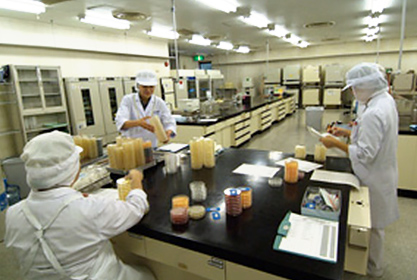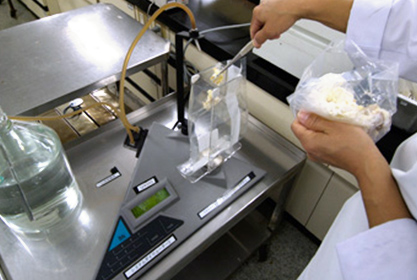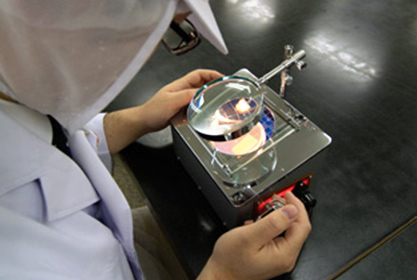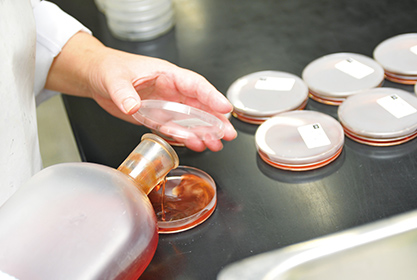From the inspection of business partners and raw ingredients to intermediate processing and finished menu items, strict inspections are imposed at each stage to ensure quality in terms of hygiene.
Indicators / KPI
Thorough Inspections by the Quality Management Group
The Quality Management Group, which manages food safety, conducts bacterial tests at its own hygiene inspection laboratory before the introduction of new products, regardless of whether they are proprietary or purchased products. In this way, we ensure that only ingredients that have passed inspections based on our strict internal criteria are delivered to our stores nationwide. Even after distribution has begun, we conduct periodic sampling inspections at eight hygiene inspection laboratories around Japan, covering the entire supply chain from raw ingredients to processing and serving, to confirm safety at each stage.
In bacterial and residual pesticide testing, inspection items and reference values are determined for each item. When a test result exceeds the reference value, prompt measures are taken, such as prohibition of use or discontinuation. By conducting hygiene patrols at each of our restaurants and stores in conjunction with operational audits, we perform thorough checks and provide guidance on more than 50 checklist items related to hygiene, including ingredient management and the state of cleaning. In addition, at our central kitchens, we are investing efforts into educating employees by checking processes and the state of hygiene management through unannounced monthly checks based on ISO 22000 concepts, and by reviewing the results. The number of samples tested by the Group each year is about 100,000, which is a top-class level for the restaurant industry.
Skylark Group recognizes food safety as a pressing issue for the entire industry and actively contributes to raising its standards. Specifically, we proactively adopt and adhere to industry-wide quality management systems, such as the "Manual for HACCP Implementation in the Foodservice Industry," "Guidelines for Allergen Labeling," and "Information Provision on the Origin of Raw Materials for Restaurant and Home Meal Replacement Foods" established by the Japan Foodservice Association (JF). Furthermore, we provide our expert knowledge to the development and revision processes of these guidelines, striving to improve food safety standards across the industry.
We also recognize the potential negative impacts that our processed foods and beverages may have on customers—such as allergies, food poisoning, residual pesticides, and improper nutritional balance—and consider their reduction a key priority. We are committed to maintaining the highest standards of food management by applying strict quality control standards (e.g., HACCP-based proprietary standards) throughout all processes, from raw material procurement to serving. We provide clear and transparent information on allergens and ingredients, and respond swiftly and sincerely to any incidents to continue earning the trust of our customers.
Furthermore, we recognize the unique challenges faced by vulnerable groups who are susceptible to food-related health impacts, such as customers with allergies, small children, and the elderly, and we consider it our important responsibility to address them. Based on this recognition, we ensure the safety and peace of mind of these vulnerable groups by meticulously providing detailed allergen information and tailoring our menus and services to meet diverse needs.
Pesticide Residue Inspections
In March 2022, we began in-house pesticide residue inspections to further ensure our level of food safety. In addition to checking the state of pesticide management in the field, we confirm the safety of the products we serve by inspecting the raw ingredients used and the products manufactured by our central kitchens.
Work that Ensures Safe Quality
Skylark Group has a division called the Quality Management Group, which engages in activities to achieve our definition of food hygiene: any and all actions to provide safe and secure food.
Activities include educational activities for in-house hygiene education, unannounced hygiene inspections of stores and central kitchens, disclosure of information on allergens and nutritional components of menu items, and creation of rules for personal hygiene and internal hygiene management of store and central kitchen employees. In order to provide safe products to customers, the Group operates eight inspection rooms that cover our central kitchens nationwide.

Our testing laboratories are open 365 days a year.

Weighing ingredients to be cultured and inspected.

Number of bacteria are counted.
Here, we mainly conduct bacteriological testing, hygiene inspections of stores and central kitchens to verify that the food served to customers is safe. Since bacteriological testing requires us to set standard values for each food item, there are around 170 types of testing standards. Bacterial reference values are set for raw ingredients and products purchased externally, products manufactured at our own factories, and products prepared at stores.
Advance testing before the introduction of new menu items, random testing after introduction and daily testing are referred to as the three pillars of testing. Bacteriological testing is conducted on a daily basis. Results are determined mainly the day after the inspection, and if there is a bacterial defect, we issue hygiene guidance at stores and central kitchens, investigate the causes, and implement countermeasures. If bacteria exceeding the standard value are detected, an emergency notice may be issued to stores and the offending food item will be banned from use.

The number of samples tested per day is over 100.
Bacterial standard values are determined by the Quality Management Group with reference to values determined by national legislation, those stipulated by hygiene norms, local prefectural guidance standards, and the opinions of external academic experts.
The Quality Management Group which performs this role, together with our ten central kitchens nationwide, has acquired certifications for international standards, such as the ISO14001 Environmental Management System and ISO45001 Occupational Health and Safety Management System standards.
When purchasing food products, we investigate in advance whether the level of hygiene and quality control meets a certain level based on the Basic Factory Checklist, and purchase products only from business partners who have passed these tests.